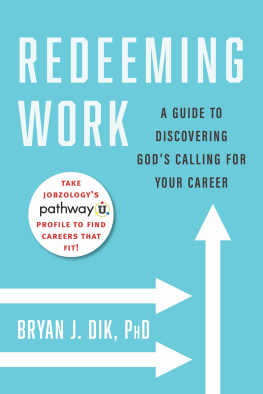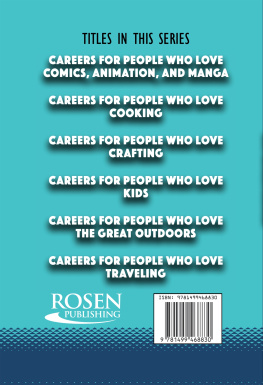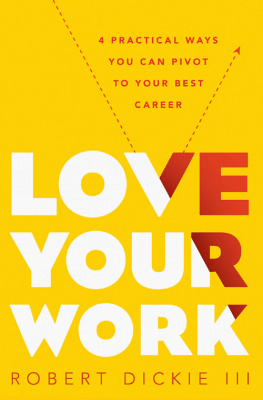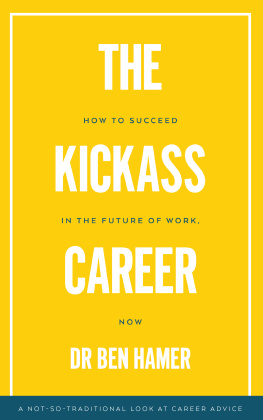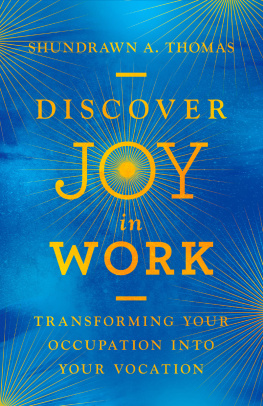Make Your Job a Calling

How the Psychology of Vocation
Can Change Your Life at Work
Bryan Dik, PhD,
and Ryan Duffy, PhD

TEMPLETON PRESS
Templeton Press
300 Conshohocken State Road, Suite 500
West Conshohocken, PA 19428
www.templetonpress.org
2012 by Bryan J. Dik and Ryan D. Duffy
All rights reserved. No part of this book may be used or reproduced, stored in a retrieval system, or transmitted in any form or by any means, electronic, mechanical, photocopying, recording, or otherwise, without the written permission of Templeton Press.
Designed and typeset by Gopa & Ted2, Inc.
Library of Congress Cataloging-in-Publication Data Dik, Bryan J.
Make your job a calling : how the psychology of vocation can change your life at work / Bryan J. Dik, Ryan D. Duffy.
p. cm.
Includes bibliographical references.
ISBN 978-1-59947-380-2 (hardback)
ISBN 978-1-59947-420-5 (ebook)
1. Job satisfaction. 2. Job satisfactionReligious aspects. 3. WorkReligious aspects. 4. Career development. 5. Job enrichment. I. Duffy, Ryan D. II. Title.
HF5549.5.J63D55 2012
650.1019dc23
2012014122
Printed in the United States of America
12 13 14 15 16 17 10 9 8 7 6 5 4 3 2 1
To Amy, and to our boys:
Eli, Silas, Abram, and Jasper
B. D.
To my parents,
Michael and Dorothy Duffy
R. D.
Acknowledgments
E ASILY THE BEST PART of writing a book, for us anyway, happens before the real writing even starts. The excitement that comes from dreaming up a project, mapping it out, and creating the skeleton that will support the rest of the body is palpable. Once all that is done, the hard work begins. To be sure, bursts of vigor and excitement happen along the way, but for sometimes very long stretches at the writing desk, motivation and effort must be anchored by other factors. Our belief in the ideas we are promoting and our desire to share them are two such factors. But nothing is more powerful and valuable than the support, generosity, encouragement, and expertise of the people we are blessed to have around us. Yeah, its clich, but the truth is that, without them, the book you are reading right now quite literally would not exist.
Bryan would like to thank his colleagues and students (present and former) at Colorado State University who provided support and helped sharpen his thinking about this topic, especially Ernie Chavez, Kurt Kraiger, Michael Steger, and Brandy Eldridge. Thanks also are due to Jo-Ida Hansen and Wayne Joosse for their ongoing mentorship and support; to Terry Gray, Andy Tix, and Amy Van Guilder Dik for their extremely helpful feedback on earlier drafts of this manuscript, to Matthew Schaap for his expert advice early on, and to the team at Career Analytics Network for their encouragement. Bryans extended family was extremely supportive and encouraging, especially his parents and siblings. But his biggest debt of gratitude is owed to his wife, Amy, and their four young sons, whose personal sacrifices were both significant and absolutely critical in allowing deadlines to be met. Their steadying influence, understanding, and encouragement made all the difference (and still does).
Ryan would like to thank his academic mentorsDavid Blustein, Bob Lent, and Bill Sedlacekfor helping him develop and refine his work on calling. Thanks to all the colleagues who have supported his work on this topic, especially Nicole Borges, and his colleagues at the University of Florida. Thanks to Ryans five doctoral studentsAlex Jadidian, Carrie Torrey, Liza Bott, Blake Allan, and Kelsey Autinwho have worked with him on several calling projects and provided support in various ways for the writing of this book. Finally, and most importantly, thanks to Ryans parents, whose hard work and dedication to his education gave him the opportunity to pursue his own calling.
Together, we would like to thank the outstanding team at Templeton Press, who provided invaluable guidance, expert advice, and support. In particular, we wish to acknowledge Susan Arellano, Sharon Kelly, Natalie Silver, and Matt Smiley. We also recognize and appreciate the support that Dr. Jack Templeton provided for this project. Thanks also to David Myers for connecting us and for his ongoing support and encouragement. There are others who warrant mention and who we wish not to overlookyou know who you are.

Recovering Calling
O N A WARM August afternoon on U.S. Highway 50, at Monarch Pass in the Rocky Mountains of Colorado, Bryce Eldridge lightly tapped the accelerator in his car and inched forward. His eyes bounced from the clock to the speedometer to the long line of traffic ahead of him, and he sighed heavily. His dad waited for him in Gunnison for a long-overdue backpacking trip in the West Elk wilderness, and he was itching to get there. He didnt expect this kind of delay, and he could only speculate as to its cause. An accident? A fallen boulder? The countless procession of curves in the highway, which hugged the mountainside, made it impossible to see far enough ahead to identify the source of the slowdown. Finally, after fifteen more minutes and a slow crawl around a couple more hairpin turns, he looked ahead and saw the problem: A repair crew had closed down half of the two-lane thoroughfare, leaving just one lane for the Friday afternoon, get-me-to-my-cabin traffic to bleed through.
Ahead of the rest of the crew, marking the entrance to the coned-off single lane, stood a silhouetted figure leaning against the unmistakable octagon of a stop sign, affixed to a pole in his right hand. Bryce squinted into the sun, and the figure revealed himself as an orange-vested flagger. Bryce pondered the mans plight. Wearing jeans, a plaid shirt, hard hat, and work boots astride the newly patched pavement, his job consisted of barking directives back and forth across a two-way radio with the other flagger, at the other end of the construction zone. To direct the flow of traffic, every few minutes he rotated his sign from stop on the one side to slow on the other. Then, after a time, back to stop. Then back to slow. And so on, and so on.
Bryce braced himself as he approached the repair site. Always the victim of Murphys Law scenarios, he watched the flagger turn the sign to stop immediately after the third car ahead of him steered around the cones and into the one open lane. He rolled his eyes and applied the brakes, submitting to his role near the front of what would soon become a long line of cars. Bryce turned back the keys in his ignition, and the hum of his cars engine went quiet. He knew hed be waiting a while. He rolled down his window and breathed in the warm mountain air, which at this spot was accompanied by an unpleasant asphalt aroma. Noticing that he was within earshot of the flagger, he turned off his car radio and tried to hear what he could. The flagger began to strike up a conversation with the driver of the moss-green Subaru ahead of Bryce. With a tone of genuine, almost compassionate honesty, the driver said, Im sorry, but that has got to be the most boring job I can imagine. How can you stand it? Bryce leaned toward the flagger, his head half out of the window, anticipating a response to the question.
The answer surprised him.
It surprised us, too, when we heard the story. The flagger perked with enthusiasm and proudly exclaimed, without hesitation and apparently without irony, I love this job! Love it. You know why? Because it matters. I keep people safe. I care about these guys behind me, and I keep them safe. I also keep you safe, and everyone else in all those cars behind you. I get to make a real, tangible difference every day. After a drawn-out pause, as if the flagger was trying to decide whether to say this or not, he added, Im grateful that I was led here.
Next page

